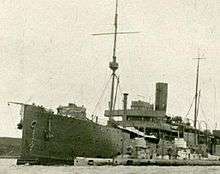HMS G8
 HMS G9, a Royal Navy G-class submarine. | |
| History | |
|---|---|
| Name: | HMS G8 |
| Builder: | Vickers |
| Laid down: | 18 December 1914 |
| Launched: | 1 April 1916 |
| Commissioned: | 30 June 1916 |
| Fate: | Lost 14 January 1918 |
| General characteristics | |
| Displacement: | Surfaced / Submerged: 703 tons / 837 tons |
| Length: | 57.5 m |
| Beam: | 6.92 m |
| Draught: | 4.15 m |
| Propulsion: |
Twin-shaft, 2 × 800 bhp Vickers diesel, 2 × 840 shp electric motors |
| Speed: | Surfaced / Submerged: 14 knots (25.93 km/h)/ 9.0 knots (16.67 km/h) |
| Range: | 44.14 tons of fuel oil giving 3,160 nm surfaced at 10 knots (19 km/h). 95 nm submerged, at 3 knots (6 km/h). |
| Complement: | 31 |
| Armament: | Torpedoes: 2 × 18" bow tubes, 2 × 18" beam tubes, 1 × 21" stern tube. 10 torpedoes in total. Guns: 1 × 3" 10 cwt. Mk.1 Elswick Quick Fire High Angle {QFHA}, forward. 1 × 12 pdr. 8 cwt. Mk. 1 gun HA mounting, aft. |
HMS G8 was a G-class submarine of the Royal Navy that saw service during World War I. Costing an estimated £125 000, the G-class subamrines were twin-shaft vessels with two eight-cylinder diesel engines that together generated 1,600 bhp (1,193 Kw), giving a surface speed of 14 knots. Two single-armature motors, each of 420 bhp (313 Kw), gave a submerged speed of 9 knots. The class carried 200 cells in two battery tanks, which gave a submerged endurance of 95 nautical miles (176 km) at 3 knots.
War service


Like the rest of her class, G8′s role was to patrol the North Sea in search of German submarines.
G8 belonged to the 10th Flotilla during her war service, but also operated out of Scapa Flow during most of 1917. Her patrol areas were from north of Shetland to Norway, the Skagerrak, the Kattegat, and the Horns Reef. She also made one patrol out of Harwich for the 9th Flotilla in August 1916 before joining the Tees Flotilla.
Her two commanding officers were Lieutenant Charles de Burgh from 30 June 1916 to 30 July 1917 and Lieutenant John F. Tryon from 30 July 1917 until her loss.
Her last patrol began from Tees on 27 December 1917, leaving with the submarine HMS G12 and the destroyer HMS Medea for the Kattegat. She was ordered to start her voyage back on 3 January 1918 or possibly 48 hours later, returning to Tees on or around 6 January 1918. She did not return and was never heard from again. She was officially declared missing on 14 January 1918. The cause remains unknown, but it is believed she may have hit a mine in the North Sea.[1]
Discovery and salvage
G8 was discovered and partly raised by wreck hunters in 2011 after 93 years at the bottom of the North Sea. The wreck was found in 47 meters (154 ft) of water off the coast of Denmark near Jutland. A Danish salvage crew raised the 11-tonne G8′s bronze conning tower in August 2011.
References
- Colledge, J. J.; Warlow, Ben (2006) [1969]. Ships of the Royal Navy: The Complete Record of all Fighting Ships of the Royal Navy (Rev. ed.). London: Chatham Publishing. ISBN 978-1-86176-281-8. OCLC 67375475.